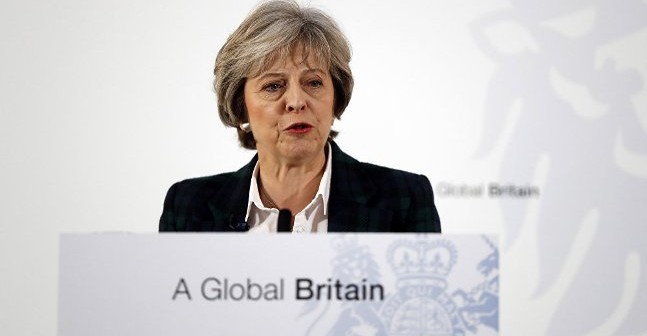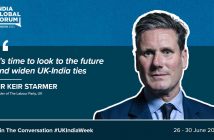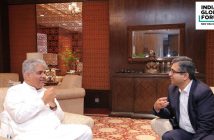India will have to be careful the tide of anti-globalisation does not derail its own march to economic growth, writes India Inc. CEO Manoj Ladwa.
Two events, unrelated at some levels, but intrinsically connected to the world’s – and India’s – continuing economic prosperity are unfolding simultaneously on two sides of the Atlantic Ocean.
In London, British Prime Minister Theresa May, living up to her reputation as the Iron Lady 2.0, summoned diplomats of the European Union to Lancaster House and minced no words while cautioning them against playing hardball on Britain’s exit from the common market.
Warning Brussels that punishing Britain with a bad trade deal post-Brexit would be “an act of calamitous self-harm”, she indicated that her government wanted a pact that did not entirely pull up the drawbridges that connect Britain with the Continent.
She also outlined her vision of turning Britain into a low tax global business hub, a la Singapore, by “setting competitive tax rates and policies that would attract the world’s best companies and biggest investors”.
The message was blunt and clear: Her Majesty’s Government would go to any length to safeguard the country’s allure as one of the world’s great business destinations and a gateway to global markets.
Almost on cue, France’s finance minister Michel Sapin countered May, saying the British Prime Minister’s statement proves “how helpless the British government is in the face of a situation that some of them didn’t want.”
These are only the opening salvos in a long drawn battle of attrition between British and EU negotiators that is expected to be brutal, cut-throat and potentially very nasty.
Boardrooms around the world are worried. There’s no doubt about that. HSBC announced it was moving 1,000 jobs from London to Paris and Toyota Motors wondered aloud how it would survive (in Britain) after Brexit.
It isn’t just HSBC and Toyota. Several large and medium Indian business houses such as the Tatas, Bharti Airtel, Wockhardt and Eicher Motors (makers of the iconic Royal Enfield motorcycles), among others are also wondering what will happen to the billions they have invested in Britain.
 Indian companies are the third-largest group of foreign investors in the UK; the Tata Group is Britain’s largest single manufacturing sector employer; and Indian investments in Britain are larger than the total Indian investments in the rest of the EU combined. Though the balance has been steadily shifting in the past few years.
Indian companies are the third-largest group of foreign investors in the UK; the Tata Group is Britain’s largest single manufacturing sector employer; and Indian investments in Britain are larger than the total Indian investments in the rest of the EU combined. Though the balance has been steadily shifting in the past few years.
Many of these companies have made Britain the base of their European operations. If May is unable to land a good deal for Britain, access to the common market will become difficult for these companies and billions of pounds worth of investments, predicated on unfettered access, may have to be written down.
Yes, a United Kingdom that lowers tax rates and eases regulations to make it more international business-friendly will definitely be a huge plus but will these incentives compensate for the loss of access to the vast European market? Will such an approach mean, as the Opposition Labour Party claims, that the UK risks becoming not a Singapore but a bargain basement in the edge of the mighty European continent with sliding salaries and job insecurity?
The truth is: we don’t know. And the UK government’s overall handling thus far of the messaging has at best led to muddle and uncertainty.
But what is clear is the fact that disruption is the new normal – and businesses can’t thrive in such an atmosphere.
But Brexit’s disruptive potential – however strong and widespread – could seem, in the years and decades to come, as just a storm in a tea cup compared to what might emerge from across the Atlantic Ocean, where Donald Trump has just been sworn in as the US President.
The same impulses that drove the Brexit vote – popular disenchantment with the globalisation process, which has created unprecedented wealth for some but taken away jobs from and fuelled insecurities among many more – has swept a maverick into the Oval Office, arguably the most important and powerful corner room in the world.
Trump has promised to tear up multilateral trade agreements signed by his predecessors, pull up the drawbridges on foreign immigrants and penalise companies that outsource jobs and services to cheaper locations around the world.
We still don’t know what steps he will take to make good on his pre-poll promises but the early signs don’t augur well for the free world, of which India is a key part.
Experts say an increasingly isolationist US will create fertile ground for China, an autocracy with a clearly expansionist agenda, to expand its spheres of influence in Asia, Africa and other parts of the world.
These two developments on either side of the Atlantic will present the world with a problem it hasn’t faced since the demise of the Soviet Union. It will only get worse if the epidemic spreads to France, Italy and other parts of the EU.
Globalisation and the integration of national economies into the global supply chain has created unprecedented prosperity across the world. The main beneficiaries of this process – the US and the countries that make up the EU – seem to be now turning their backs on the very process that served them so well since the Second World War.
In this disruptive new normal, there will be a new set of winners and losers. Trump’s entry into the White House and Britain’s exit from the EU could, thus, be the trumpet call for the emergence of a new and uncomfortable world order.
Prime Minister Narendra Modi, who has bravely led India’s economy to the frontiers of this process, will have to consider his next moves very carefully to ensure that India’s march to the global high table is not derailed by the anti-globalisation sentiments being fanned in the Atlantic-rim nations.







